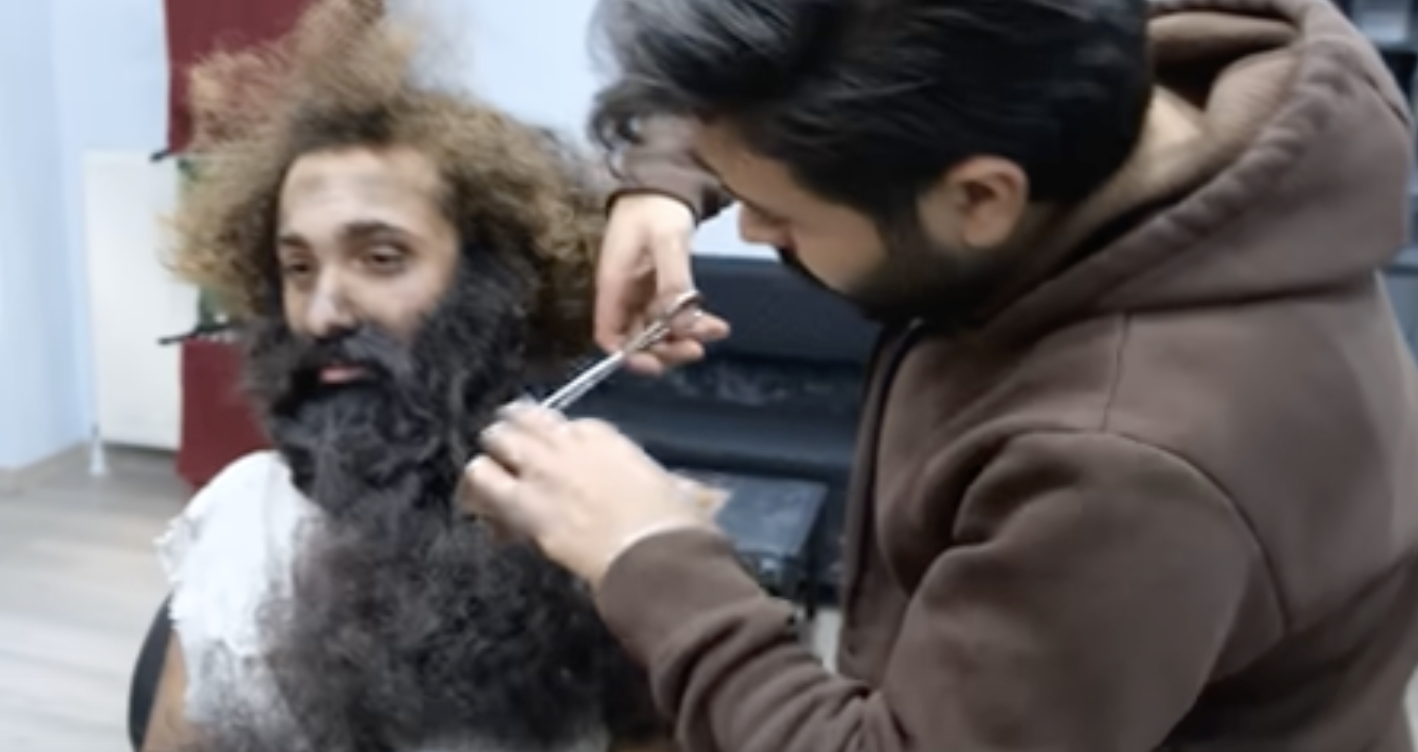Every morning at exactly 7:15, Marcus Reed would take his usual route down Maple Avenue, carrying nothing but a plastic bag filled with what he’d salvaged from the bins of corner stores. Most people didn’t see him—at least, not really. They saw the dirt-smudged coat, the crusted layers of a life lived in the streets, and quickly looked away. To them, he was just another ghost haunting the sidewalks of the city.
But Sarah, who owned the modest barbershop on the corner, noticed him every day.
She had for years.
She never spoke to him—never wanted to intrude—but something about his gait, his discipline, and the faded army patch on his jacket stirred a quiet curiosity. He walked like a man who had once stood tall.
It was on a Tuesday, during the bitter tail-end of February, that the moment came. The wind was cruel, biting the cheeks of every passerby, and Sarah had just opened her shop when she saw Marcus stumble. Not dramatically—just a quick falter of his step, like the strength in him flickered.
She rushed outside.
“Sir? Are you okay?”
Marcus flinched, clearly not used to being addressed directly. His eyes, a striking blue beneath layers of grime, studied her warily.
“I’m fine,” he rasped, his voice hoarse from disuse.
Sarah hesitated, then pointed gently to her shop. “Would you come inside for a bit? Just to warm up. I make good coffee.”
Marcus didn’t answer immediately, but after a beat, he nodded.
The warmth of the shop enveloped him like a forgotten blanket. He stood awkwardly, unsure where to be. Sarah handed him a steaming cup.
“No strings. Just kindness,” she said softly.
He sat, clutching the cup, eyes still darting as if waiting for the catch.
“Would you let me give you a trim?” Sarah offered. “It’s on the house. I’ve been a barber for 17 years—trust me, I won’t mess it up.”
He looked at her, stunned.
“I… I don’t even know what I look like anymore,” he murmured.
“Let’s find out,” she said with a smile.
That was how it started.
As Sarah began snipping away layers of overgrown hair, the room grew silent. It was as if each strand carried a burden, and as it fell to the floor, something lighter began to emerge. Beneath the grime, the beard, the tangled knots of neglect, there was a man who had once been somebody—someone strong, proud.
Marcus sat still, eyes focused on nothing, but his jaw relaxed. Sarah worked carefully, respectfully. She didn’t ask too much—only offered a mirror when they were done.
He stared at his reflection for a long time.
“…I remember this man,” he whispered.
Sarah’s heart clenched. “He never left. He was just… waiting.”
In the days that followed, Marcus came by the shop more often. Sometimes for coffee. Sometimes just to sit. Slowly, his story unfurled.
He had been a mechanic, once. A soldier, long ago. He’d lost his wife in a car accident fifteen years prior, and the grief had eaten him from the inside. When the bills piled up and the weight of life became too heavy, he simply… stepped out of it. Vanished into the city’s shadows.
He never begged, never asked for help. Just existed, surviving. Forgotten.
But after the haircut, something changed. People began to notice him—not the version they had ignored, but the man he was becoming again. One shop owner offered him a part-time job organizing inventory. Another, a hot meal.
Sarah, seeing the change in his eyes, introduced him to a veteran’s support group. He went, hesitantly, and found voices like his own.
By spring, Marcus had shaved again—by choice this time—and started working full-time at the warehouse down the street. He rented a small room above a bakery and picked up a second-hand phone.
His first text was to Sarah.
“Thank you for seeing me when no one else did.”
She replied with a simple heart emoji and a photo of the empty barber’s chair.
Months passed. One morning, a news crew came to the shop, curious about the man who had been “transformed by a haircut.” They wanted to film, to interview her, to make it into a feel-good story.
Sarah agreed—on one condition: Marcus tells it himself.
At the interview, Marcus stood tall in a button-down shirt and clean jeans. He smiled shyly at the camera.
“It wasn’t just the haircut,” he said. “It was being treated like a person. Being looked at—not through me. That one act reminded me that I was still here.”
The story went viral.
People from all over sent letters, job offers, donations. But Marcus declined most. What he wanted wasn’t fame. It was dignity.
He now volunteers weekly at shelters, helping others get their footing. He sweeps the barbershop every Saturday morning before the first appointment, just to stay connected to the place where everything changed.
One day, a young man, no older than twenty, stepped into the shop, clothes tattered, face hollow. Sarah was about to greet him when Marcus walked up, gently placed a hand on the boy’s shoulder, and said:
“Come sit. Let’s find you in there.”
Because Marcus Reed wasn’t just a man who got a haircut.
He became the mirror through which others could rediscover their own reflection.
